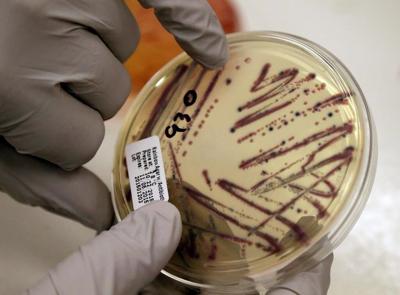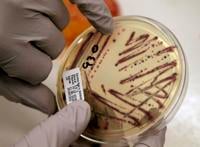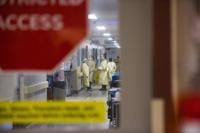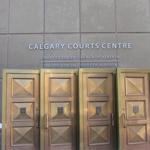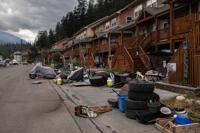CALGARY - The Calgary daycares linked to an E. coli outbreak could reopen early next week as a potential class-action lawsuit is being considered by some parents whose children were infected.
Alberta Health Services said there are 142 lab-confirmed cases of E. coli — up from 128 a day earlier — connected to an outbreak at up to 11 Calgary daycares.
Dr. Francesco Rizzuti, medical officer of health in Calgary, said four of those 11 sites have had no reported E. coli cases and would be allowed to reopen Monday if that continues.
"I want to stress that the health and safety of children and staff are our absolute top priority," he told reporters at a news conference on Friday.
"Facilities will only reopen if we are confident that health and safety will not be affected."
Rizzuti said the remaining seven facilities could be allowed to reopen Tuesday, but all children and staff will be required to show proof of a negative test before they can return. They are also not permitted to attend other child-care facilities, he added.
There's a total of 26 patients receiving care in two Calgary hospitals, while five have been discharged.
Eleven of the hospitalized patients have serious illness, said Rizzuti, and a "small number" are receiving dialysis.
"At this time, all children on in-patient units are stable," he said, noting AHS has brought in additional dialysis machines, vital sign monitors and IV pumps.
"Staff are working hard to ensure all patients are getting the care that they need," he said.
Dr. Stephen Freedman, an emergency physician at Alberta Children's Hospital and professor in the Cumming School of Medicine at the University of Calgary, said it's been a chaotic week.
The E. coli, he said, is not a typical strain that causes two or three days of watery diarrhea, vomiting or abdominal cramps. It's a type of E. coli 0157, which secretes a toxin that can lead to organ damage.
Freedman said about 20 per cent of children develop hemolytic uremic syndrome, a condition that affects the kidneys and causes blood clots.
"We are seeing some HUS cases," he said. "The typical course is that the children have significant abdominal pain, diarrhea, vomiting and sometimes they get dehydrated early on."
Some of the infected children, he said, are being managed as outpatients at clinics set up at hospitals across the city.
The medical updates come as a Calgary lawyer said she's preparing a potential class-action lawsuit on behalf of the families.
Maia Tomljanovic, who has worked on similar cases in the past, said she has spoken to dozens of parents whose children have been infected, and that she's aware there are many others.
She said it's common for class-action lawsuits in such cases because of the number of claimants.
"It can be very difficult for the courts to handle the numerous individual claims being litigated at the same time," she said.
Tomljanovic said they are in the "early days" of potentially filing a lawsuit.
She said it would take years to litigate and that most of the parents are focused on their children's health at this time.
Parent John Greenbow said his two-year-old son Emmett contracted E. coli at one of the Fueling Brains locations, but the toddler didn't need to stay in hospital.
"Right now, we are seeing some elevated platelet levels and some blood in my son's urine … so indications that his kidneys are fighting the toxicity that's caused by this specific E. coli bacteria," he said.
"We're taking it seriously, obviously, but at this point he hasn't been admitted (or) on dialysis."
Greenbow said he'd consider legal action once his son recovers.
Lorian Hardcastle, an assistant professor at the University of Calgary's faculty of law who specializes in health law and policy, said a negligence claim against either the daycare or the food provider would require two elements "other than the injury, which we have."
Any lawsuit, she said, would have to prove they didn't meet the standard of care.
"A failure to follow Alberta Health Services standards around food handling would be evidence of a failure to meet the standard of care," she said. "We don't know if that has happened here.
"People often jump to the conclusion that, because there's an injury, someone must have done something unreasonable but the fact of the matter is that, even with correct handling of food, you're never going to have 100 per cent elimination of all bacteria."
The second thing that a lawyer would need to show in a negligence claim would be proof it caused the specific injury, she said.
"Not only do you have to be able to demonstrate that they didn't do x, but you also have to be able to show that not doing x caused you to get sick," said Hardcastle.
"The fact that there have been so many children helps that argument."
She noted that a lawsuit may not result in significant damages, partly because Canada's health-care system is publicly funded and there wouldn't be a lot of out-of-pocket costs for parents.
"You could still potentially recover damages for obviously pain and suffering," she said.
"And if some of the kids have the long-term kidney issues associated with this, certainly there's potential damages to pursue there."
Hardcastle said it's possible all standards were followed but that contamination still found its way into the food.
"It could be a long time for us to know that," she said.
Health officials said they are still trying to determine the source of the outbreak, but have not yet pinpointed it.
— With files from Jamin Mike in Edmonton.
This report by Ďă¸ŰÁůşĎ˛ĘąŇĹĆ×ĘÁĎ was first published Sept. 8, 2023.

